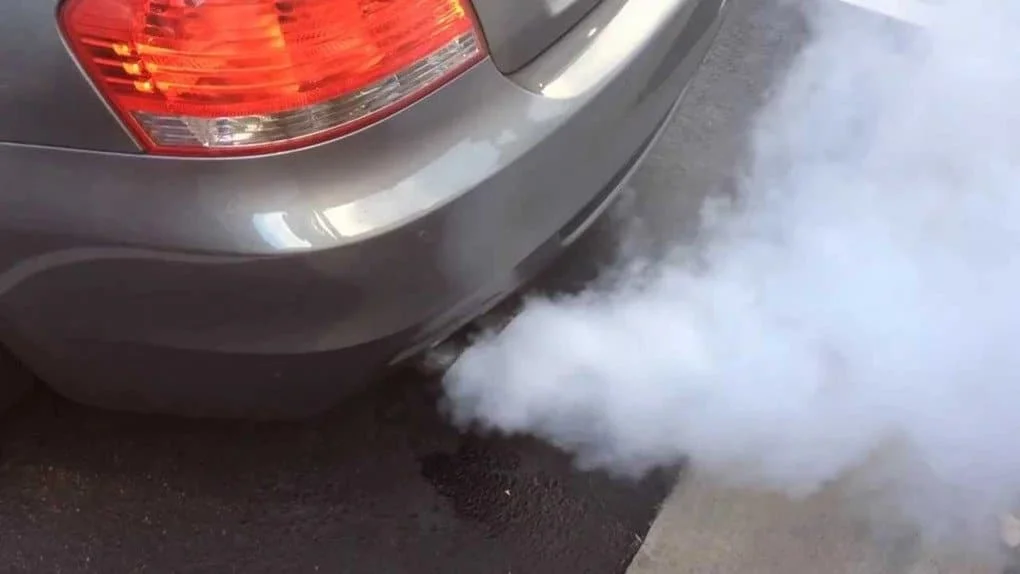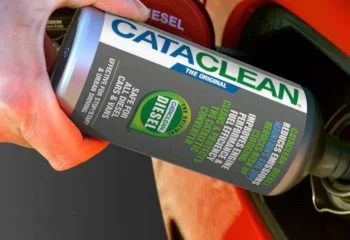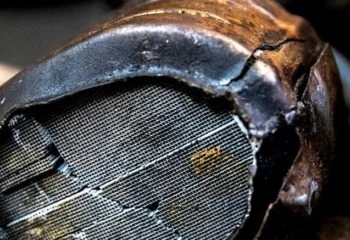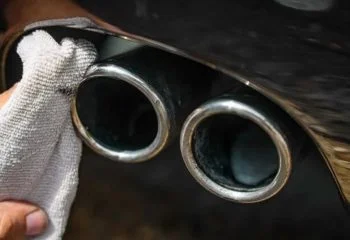If you have ever noticed white smoke from exhaust when accelerating, you may be wondering what is causing it and how to fix it.
There are a few different things that could be causing this, so it is important to troubleshoot the problem to find the root cause.
In this blog post, we will discuss the possible causes of white smoke from exhaust and ways to fix them. We will also provide some helpful tips for keeping your car running smoothly.
So, if you are experiencing this issue, keep reading for more information.
What's in this post?
What white smoke from exhaust means
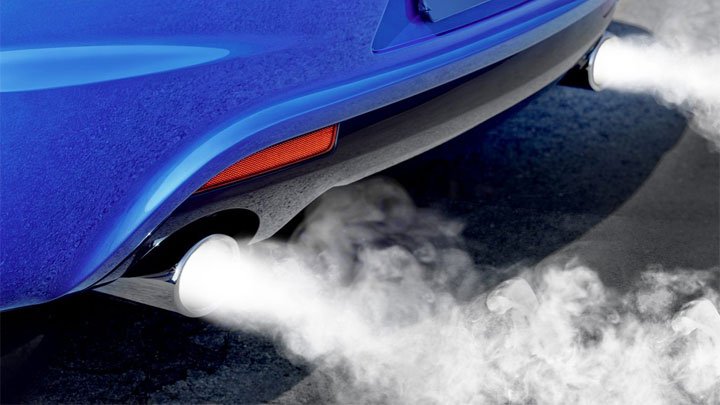
First, it is important to understand what white smoke from exhaust actually means. When your car is running, the engine produces combustion gases. These gases are typically expelled through the tailpipe as exhaust.
However, if there is a problem with the engine, some of these gases can escape through other areas, such as the sides of the engine or the tailpipe.
White smoke coming from the tailpipe is an indication that coolant is leaking into the combustion chamber. This can happen for a variety of reasons, which we will discuss later.
When this happens, it causes the fuel to burn incompletely, which results in the production of white smoke. In some cases, you may also notice that your car’s engine is running rough or misfiring.
If you notice white smoke coming from your car’s exhaust, it is important to take action right away. If the problem is not fixed, it can cause serious damage to your engine.
8 Common causes of white smoke from exhaust when accelerating
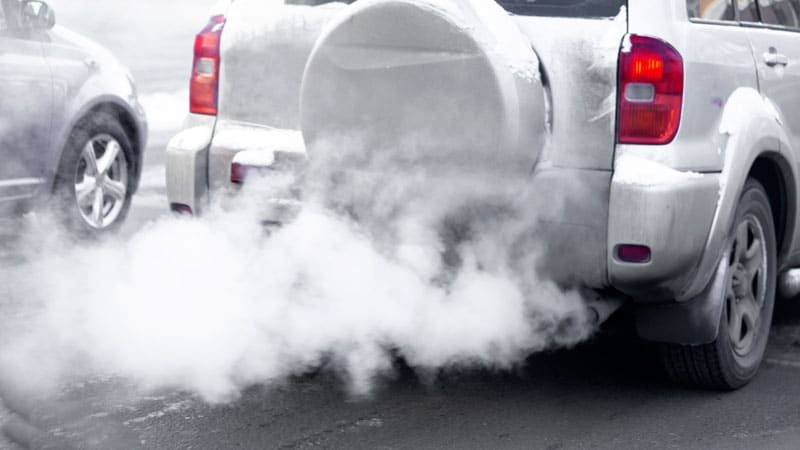
There are a few different things that could be causing your car to produce white smoke from the exhaust. Here are some possible causes:
- Cracked cylinder head or block
- Faulty head gasket
- Leaking intake manifold gasket
- Faulty injector
- Coolant leak
- Transmission fluid
- Engine Control Unit error
- Condensation burn
Cracked cylinder head or block
Cracked cylinder heads or blocks are a serious issue because they can cause white smoke to come from the exhaust. This is due to leakage of compression between the cylinders.
The most common cause for this type of problem is overheating. When the engine gets too hot, it can cause the metal to warp and eventually crack.
As the engine runs, hot gases escape from the combustion chamber and pass through the cylinder head. If there is a crack in the cylinder head or block, these hot gases can escape, causing the engine to run less efficiently.
In addition, the escaping gases can cool rapidly as they come into contact with the cold air outside, causing condensation.
This condensation can then be expelled through the exhaust system, resulting in white smoke. Fixing a cracked cylinder head or block is essential for preventing this problem.
If you see white smoke coming from your exhaust, it’s important to have a mechanic check it out as soon as possible. A cracked cylinder head or block can lead to major engine damage if not repaired promptly.
Faulty head gasket
A head gasket is a seal that sits between the engine block and cylinder head. Its main purpose is to prevent coolant and oil from leakage.
However, a faulty head gasket can cause white smoke to come out from the exhaust. The main reason for this is that the compression of the engine increases, which forces the coolant and oil into the combustion chamber.
When this happens, the white smoke is created as a result of the burning of these fluids. In some cases, a blown head gasket can also cause an engine to overheat.
Therefore, it is important to have a head gasket replaced as soon as possible if it is suspected to be faulty. Doing so will help to prevent further damage to the engine and ensure that it runs smoothly.
Leaking intake manifold gasket
A leaking intake manifold gasket can cause white smoke to come from the exhaust. The most likely cause of this is that the gasket has failed and is no longer sealing properly.
This can allow coolant to enter the combustion chamber, where it will be burned along with the fuel. In addition to causing white smoke, a leaking intake manifold gasket can also lead to a loss of power and reduced fuel economy.
If you notice any of these symptoms, it’s important to have the problem inspected and repaired as soon as possible. Left unchecked, a leaky intake manifold gasket can cause significant damage to your engine.
Useful read: Oil In Intake Manifold: Symptoms, Causes and Fixes
Faulty injector
When a vehicle’s engine is running, fuel is injected into the cylinders through injectors. The amount of fuel that is injected must be carefully regulated in order to ensure proper engine performance.
If an injector is defective, it can introduce too much or too little fuel into the cylinder, causing a number of problems.
One symptom of a faulty injector is white smoke coming from the exhaust. This is caused by unburned fuel that has entered the exhaust system.
In addition to affecting engine performance, a faulty injector can also lead to increased emissions and decreased fuel economy. As a result, it is important to have any malfunctioning injectors repaired as soon as possible.
An exhaust leak can also cause failed emission tests and decreased fuel economy, make sure you check it as well.
Coolant leak
A coolant leak can happen for a number of reasons, such as a cracked cylinder head or block, faulty head gasket, or leaking intake manifold gasket.
When your car’s coolant leaks, it can cause white smoke to come out of the exhaust. The smoke is usually most noticeable when the car is first started in the morning, and it may appear when the car is idling or stopped.
The smoke is caused by the burning of the coolant, which turns into steam as it hits the hot exhaust system. While a small amount of steam is normal, too much can be a sign of a serious problem.
If you notice white smoke coming from your car’s exhaust, it’s important to have it checked out by a mechanic as soon as possible to avoid further damage to your engine.
Transmission fluid
Transmission fluid is responsible for keeping gears lubricated and cool. Over time, transmission fluid breaks down and becomes contaminated with debris.
When this happens, the fluid can enter the combustion chamber and cause white smoke to come out of the exhaust.
In some cases, the smoke may also smell sweet or burning. If you notice white smoke coming from your exhaust, it’s important to have your vehicle checked by a qualified mechanic as soon as possible.
Depending on the severity of the problem, you may need to have your transmission flushed or replaced. Left unchecked, transmission fluid leaks can cause serious damage to your engine.
ECU error
One of the common causes of white smoke from a car’s exhaust is an engine control unit (ECU) error. The ECU is responsible for managing the engine’s fuel mixture, and if it isn’t working properly, the engine can run too rich or too lean.
This can cause unburned fuel to be expelled through the exhaust, creating a white smoke. In some cases, an ECU error can also cause the engine to run hotter than normal, which can lead to overheating and potentially cause engine damage.
If you suspect that your car’s ECU is responsible for the white smoke from your exhaust, it’s important to have it checked by a mechanic as soon as possible.
Condensation burn
When the engine coolant temperature is lower than the dew point, water vapor in the exhaust gas condenses and forms droplets of water.
These droplets then collect on the surfaces of the cylinder head, piston, and valves, causing them to rust. In addition, the water droplets can also cause the fuel to ignite prematurely, which can damage the engine.
While condensation burn is not a serious problem, it can be a nuisance and can reduce the efficiency of the engine.
To prevent condensation burn, it is important to keep the engine coolant temperature above the dew point. In addition, regular maintenance and tune-ups can help to reduce the risk of this problem.
How to diagnose the issue
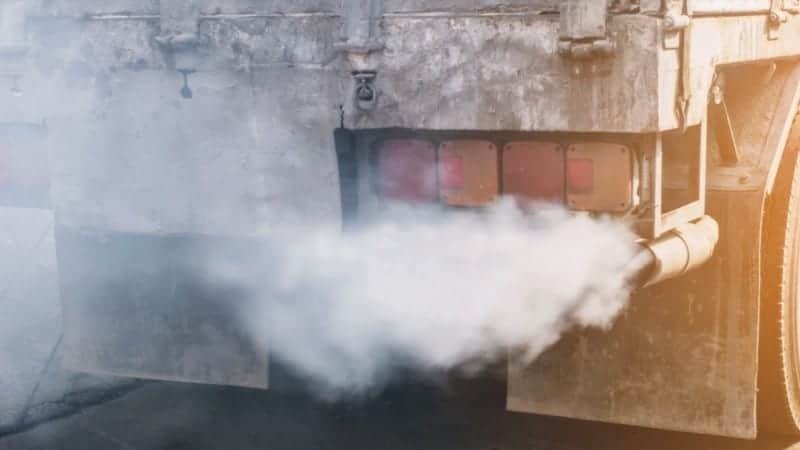
Check oil level
If you notice white smoke coming from your car’s exhaust, the first thing you should do is check the oil level. If the oil level is low, it could be an indication of a coolant leak.
To check the oil level, park your car on level ground and remove the dipstick. wipe the dipstick clean and reinsert it into the oil fill hole.
Remove the dipstick again and check the oil level. If it is below the minimum mark, add more oil until it reaches the proper level. If you still see your car smoking after oil change, maybe it’s another problem.
Check for coolant leaks
If you notice white smoke coming from your car’s exhaust, it’s important to check for coolant leaks. If the coolant level is low, it could be an indication of a leak.
To check for coolant leaks, you’ll need to remove the radiator cap and look for signs of leakage. If you see coolant leaking from the radiator, it’s likely that your car has a coolant leak. In some cases, you may be able to repair the leak. However, in other cases, you may need to replace the radiator entirely.
If you think that your car has a coolant leak, it’s important to have it checked by a mechanic as soon as possible.
Transmission fluid level
If you think your car is leaking transmission fluid, it’s important to find the source of the leak and have it repaired as soon as possible. Otherwise, you could end up damaging your car’s transmission.
One way to check for a transmission fluid leak is to check the level of fluid in the transmission. If the fluid level is low, it could be an indication of a leak.
Another way to check for a transmission fluid leak is to look for signs of fluid on the ground beneath your car. If you see fluid on the ground, it’s likely that your car is leaking transmission fluid.
If you suspect that your car is leaking transmission fluid, it’s important to have it checked by a mechanic as soon as possible.
If the transmission fluid level is normal, the next thing you should check is the ECU for errors.
Check the ECU
To diagnose the problem, you can check for codes in the ECU. These codes can pinpoint the cause of the problem and help you make the necessary repairs. In some cases, you may need to replace the ECU entirely.
However, diagnosing the problem early can help you avoid more serious damage down the road.
Check for condensation
If you think that condensation might be the cause of the white smoke from your exhaust, there are a few things you can do to check for water vapor in the exhaust gas.
One way to check for water vapor is to look for condensation on the inside of the tailpipe. If you see water droplets on the tailpipe, it’s likely that your car is producing water vapor.
Another way to check for water vapor is to touch the tailpipe after you’ve been driving for a while. If the tailpipe is hot to the touch, it’s likely that your car is producing water vapor.
If you think that your car is producing too much water vapor, it’s important to have it checked by a mechanic as soon as possible.
Check engine block for cracks
If the engine block is cracked, it could be the cause of the white smoke from your exhaust. To check for cracks, you’ll need to remove the engine oil dipstick and look for signs of oil leaks.
If you see oil leaking from the engine block, it’s likely that your car has a cracked engine block. In some cases, you may be able to repair the crack. However, in other cases, you may need to replace the engine block entirely.
If you think that your car has a cracked engine block, it’s important to have it checked by a mechanic as soon as possible.
Check fuel injectors
If the fuel injectors are dirty or damaged, they can cause white smoke to come from the exhaust. To clean the fuel injectors, you’ll need to remove them and soak them in a cleaner for a few hours.
If the fuel injectors are damaged, you’ll need to replace them. However, if the fuel injectors are only dirty, you may be able to clean them and reuse them.
It’s important to note that fuel injectors can be very expensive to replace. Therefore, it’s important to make sure that they’re the cause of the problem before you replace them.
Check cylinder head for cracks
There are a few different ways to check for cracks in your cylinder head. One way is to use a borescope – a small, flexible camera that can be inserted into small spaces.
This technique is especially useful for diagnosing white smoke from the exhaust, as it can help to identify the source of the leak.
First, the engine must be turned off and allowed to cool. Then, the borescope is inserted into the cylinder head through the spark plug hole.
Once in place, the camera can be used to inspect the cylinder head for cracks or other damage. If any are found, they can be repaired with welding or other methods.
Finally, the engine can be restarted and tested to ensure that the repairs have been successful.
Another way is to do a visual inspection, using a flashlight to look for any hairline cracks.
Finally, you can use a pressure tester to check for leaks. Attach the pressure tester to the cylinder head and pump it up to around 15 psi.
If the pressure drops quickly, there is likely a crack in the head that is allowing air to escape.
If you do find a crack, it’s important to have it repaired as soon as possible. Otherwise, the crack will continue to grow and eventually cause more serious engine damage.
Check head gasket
Checking your head gasket is a relatively simple process that can be completed in a few minutes. First, remove the oil dipstick and check the oil level.
If the oil level is too high, it’s likely that your head gasket is leaking. In some cases, you may be able to repair the gasket. However, in other cases, you may need to replace it entirely.
If you think that your head gasket is leaking, it’s important to have it checked by a mechanic as soon as possible.
How do I fix white smoke from exhaust when accelerating?
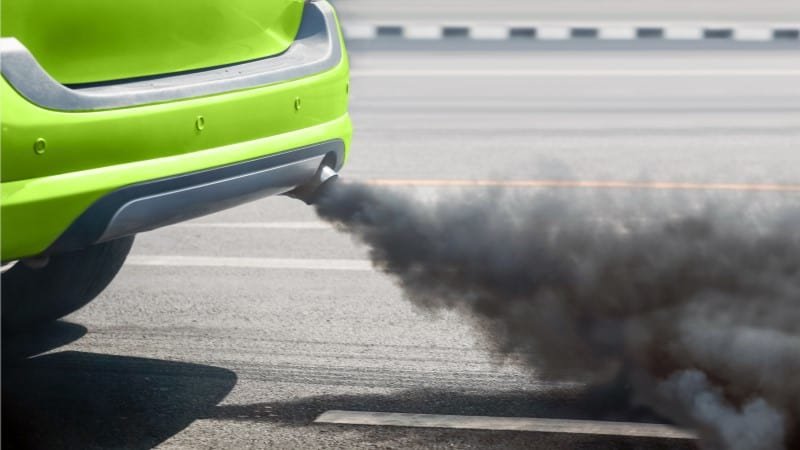
In most cases, the only way to fix this problem is to replace or repair the defective part. However, if the problem is caused by a dirty or damaged fuel injector, you may be able to clean or replace the injector and fix the problem.
It’s important to note that some of these repairs can be quite expensive. Therefore, it’s important to make sure that you know what’s causing the problem before you begin any repairs.
If you’re not sure what’s causing the white smoke from your exhaust, it’s always best to have your car checked by a mechanic. They will be able to diagnose the problem and recommend the best course of action.
How much does it cost to fix the problem?
The cost of repairs will vary depending on the cause of the problem.
If the problem is due to a cracked engine block, you may be able to repair the crack. However, in some cases, you may need to replace the engine block entirely.
Replacing an engine block can cost between $1,000 and $3,000.
If the problem is due to dirty or damaged fuel injectors, you may be able to clean them and reuse them. However, if the fuel injectors are damaged, you’ll need to replace them.
Fuel injectors can be very expensive to replace. In some cases, they can cost up to $900 each.
If the problem is due to a cracked cylinder head, you may be able to repair the crack with welding or other methods. However, in some cases, you may need to replace the cylinder head entirely.
Replacing a cylinder head can cost between $1,000 and $4,000.
Finally, if the problem is due to a leaking head gasket, you may be able to repair the gasket. However, in some cases, you may need to replace it entirely.
Replacing a head gasket can cost between $1,500 and $2,000.
In conclusion, the cost of repairs will vary depending on the cause of the problem. However, in some cases, the repairs can be expensive.
Therefore, it’s important to make sure that you get the problem diagnosed and repaired as soon as possible.
How to prevent this from happening again
The best way to prevent this problem is to have your car regularly serviced and maintained. This will help to ensure that all of the parts in your car are in good working condition.
In addition, it’s important to make sure that you use high-quality fuel and oil. This will help to prevent the build-up of deposits in your engine.
Finally, if you notice any problems with your car, make sure to have them checked by a mechanic as soon as possible.
If you follow these tips, you should be able to prevent white smoke from the exhaust when accelerating.
What other colors of smoke should I pay attention to?
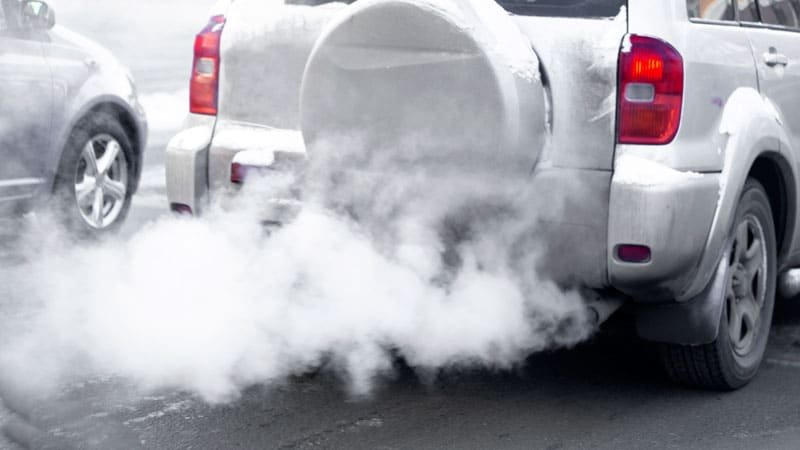
In addition to white smoke, you should also be aware of blue smoke, red smoke, gray smoke and black smoke.
Blue smoke
You should also pay attention to blue smoke. Blue smoke generally indicates that there’s oil leaking into the combustion chamber.
This can be caused by a variety of issues, such as worn piston rings or valves. If you notice blue smoke coming from your car’s exhaust, it’s important to have it checked out by a mechanic as soon as possible.
Left unchecked, this problem can lead to decreased fuel economy and increased emissions.
Black smoke
If you notice black smoke coming from your car’s exhaust, it’s generally an indication that there is a problem with the engine.
The most common cause of black smoke is incomplete combustion, which can be caused by a number of different factors. Incomplete combustion can be caused by worn spark plugs, a dirty air filter, or low fuel pressure.
It can also be caused by too much fuel being injected into the engine, or by a leak in the intake manifold.
If you notice black smoke coming from your car’s exhaust, it’s important to have the problem diagnosed and repaired as soon as possible. Otherwise, it could lead to further damage to the engine.
Gray smoke
Gray smoke can often be caused by a clogged air filter, and it’s important to have this checked since it can lead to reduced fuel efficiency and increased emissions.
A clogged air filter can also cause your car to run less smoothly, so it’s important to have it checked and replaced if necessary.
Red smoke
Red smoke coming from the exhaust is usually a sign of transmission fluid or engine coolant leaking into the combustion chamber. When these fluids come into contact with the hot engine, they can quickly turn to vapor and be expelled through the exhaust.
In some cases, the leak may be small and only result in a little smoke. However, if the leak is left unaddressed, it can eventually lead to engine damage.
If you notice red smoke coming from your car’s exhaust, it’s important to have the vehicle inspected by a qualified mechanic as soon as possible.
FAQs about white smoke from exhaust when accelerating
Does white smoke always mean blown head gasket?
No, white smoke does not always mean blown head gasket. In some cases, it may be caused by dirty or damaged fuel injectors. It can also be car components defective.
Can I drive my car if it’s smoking white smoke?
If your car is smoking white smoke, it’s important to have it checked out by a mechanic as soon as possible. While it’s safe to drive your car if it’s smoking white smoke, it’s not advisable to do so for long distances.
The reason for this is that white smoke indicates that there may be an issue with your car’s engine. Specifically, the white smoke is likely caused by an antifreeze leak.
This can lead to your car overheating, which can cause serious damage to the engine. If you must drive your car while it’s smoking white smoke, be sure to keep a close eye on the temperature gauge and pull over if the needle starts to move into the red zone.
Can too much gas cause white smoke?
Yes, too much gas can cause white smoke. This is because when there’s too much gas in the engine, it can cause the engine to run lean.
When an engine runs lean, it means that there’s not enough oil getting to the parts that need it. This can cause the engine to overheat, which can lead to white smoke coming from the exhaust.
If you notice that your car is smoking white smoke and you’re using too much gas, be sure to adjust your driving habits accordingly.
Try to use less gas and make sure that you don’t rev the engine too high. Doing this will help to prevent the engine from overheating and reduce the amount of white smoke coming from the exhaust.
Why is my car smoking but not overheating?
There are a few reasons why your car may be smoking but not overheating. One reason could be that the antifreeze level is low.
If the antifreeze level is low, it can cause the engine to overheat. This will cause the coolant to start boiling and turn into steam. The steam will then escape from the engine and come out through the exhaust as white smoke.
Another reason why your car may be smoking but not overheating could be a problem with the head gasket. If the head gasket is damaged, it can cause antifreeze to leak from the engine.
This will also cause the coolant to boil and turn into steam. The steam will then escape from the engine and come out through the exhaust as white smoke.
Finally, your car may be smoking but not overheating if there’s too much oil in the engine. When there’s too much oil in the engine, it can cause the engine to run lean.
This will cause the engine to overheat and produce white smoke from the exhaust. If you notice that your car is smoking but not overheating, be sure to check the antifreeze level and the oil level.
If either of these is low, be sure to add more. If neither of these is low, then you should take your car to a mechanic to have it checked out.
Does white smoke mean my car is burning oil?
Yes, if you notice white smoke coming from your car’s exhaust, it could be a sign that your car is burning oil. In most cases, this is caused by a problem with the engine’s piston rings or valves.
When these parts wear out, they can allow oil to enter the combustion chamber and be burned along with the fuel. This can lead to increased emissions and decreased fuel economy.
If you suspect that your car is burning oil, it’s important to have it checked by a mechanic as soon as possible. Depending on the severity of the problem, you may need to have the piston rings or valves replaced.
Can white smoke come from the exhaust when the car is cold?
While it’s not unusual to see some white smoke coming from the exhaust when you first start your car on a cold morning, it’s generally nothing to worry about. This is simply moisture in the exhaust system that is being vaporized by the heat of the engine.
However, if you notice a significant amount of white smoke coming from the exhaust even after the engine has warmed up, it could be an indication of a problem with the engine itself.
In particular, it could be a sign of a head gasket leak. If you notice this happening, it’s best to have the car checked out by a professional as soon as possible.
Can a catalytic converter cause white smoke?
Yes, a catalytic converter can cause white smoke. This is because the catalytic converter can cause the engine to run lean.
When an engine runs lean, it means that there’s not enough oil getting to the parts that need it. This can cause the engine to overheat, which can lead to white smoke coming from the exhaust.
Can bad fuel pump cause white smoke?
No, a bad fuel pump will not cause white smoke. However, if the fuel pump is not working properly, it can cause the engine to run lean.
When an engine runs lean, it means that there’s not enough oil getting to the parts that need it. This can cause the engine to overheat, which can lead to white smoke coming from the exhaust.
Can water in gas tank cause white smoke?
Yes, water in the exhaust can cause white smoke. This is because when water gets into the exhaust, it can vaporize and become steam.
The steam will then escape from the engine and come out through the exhaust as white smoke. If you notice that your car is smoking but not overheating, be sure to check the antifreeze level and the oil level.
If either of these is low, be sure to add more. If neither of these is low, then you should take your car to a mechanic to have it checked out.
Final thought
While there are many potential causes of white smoke from exhaust when accelerating, the most common cause is a cracked engine block.
Other potential causes include dirty or damaged fuel injectors, a cracked cylinder head, and a leaking head gasket. It is important to be able to identify the source of the problem so that you can take the necessary steps to fix it.
If you think that your car is producing too much white smoke, it’s important to have it checked by a mechanic as soon as possible.
By following these tips, you can help keep your car running smoothly and avoid any unwanted emissions.

